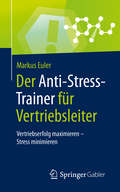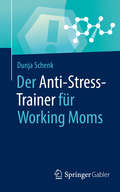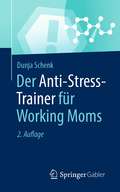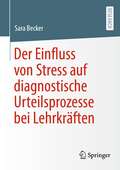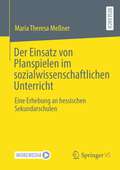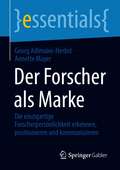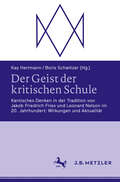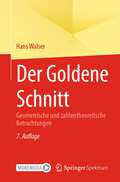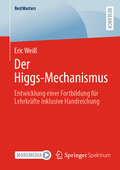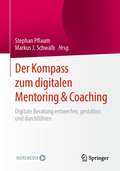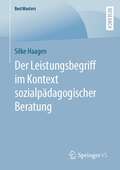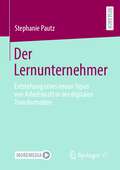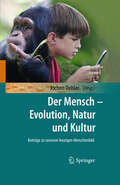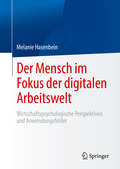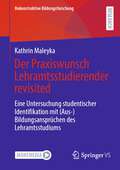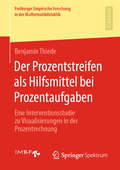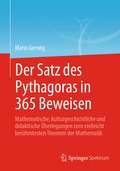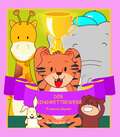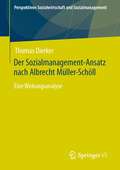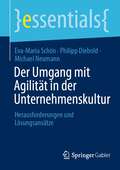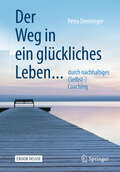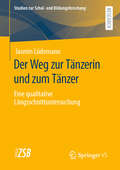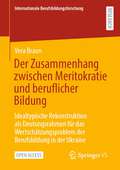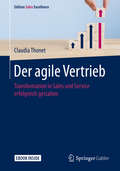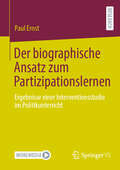- Table View
- List View
Der Anti-Stress-Trainer für Vertriebsleiter: Vertriebserfolg maximieren – Stress minimieren (Anti-Stress-Trainer)
by Markus EulerDieses Buch aus der Anti-Stress-Trainer-Reihe befasst sich eingehend mit den Stressfaktoren für Führungskräfte im Vertrieb. Es macht auf typische Alltagssituationen aufmerksam, die Stress auslösen können, lädt zum Reflektieren der eigenen Erfahrungen ein und stellt Lösungsansätze vor. Diese beschränken sich nicht nur auf Verhaltensänderungen, sondern beschreiben auch die dafür notwendigen Denkmuster und Einstellungen zum Thema. Konkrete Tipps zur Umsetzung bauen darauf auf. Dadurch profitiert der Leser nicht nur von der reinen Aufnahme von Wissen, sondern auch von einer „Schritt-für-Schritt-Anleitung“ für die Umsetzungsphase.Zusätzlich enthält das Buch ein Interview mit einem Heilpraktiker, der sich unter anderem auf die Behandlung von Stress-Symptomatiken spezialisiert hat und wertvolle Tipps gibt.
Der Anti-Stress-Trainer für Working Moms (Anti-Stress-Trainer)
by Dunja SchenkDieses Buch wendet sich an alle Heldinnen des Alltags: An die Frauen, die trotz ihrer Kinder nicht auf ihre Karriere verzichten wollen. An die Frauen, die ihre Familie genau so wichtig finden wie ihren Job. An die Frauen, die mutig die tägliche Zerreißprobe auf sich nehmen und hin und wieder feststellen, dass dieser Kampf nur selten unentschieden ausgeht. Das Buch geht auf die 10 größten Stressfallen einer Working-Mom ein und verhilft den großartigen Müttern zu mehr Gelassenheit.
Der Anti-Stress-Trainer für Working Moms (Anti-Stress-Trainer)
by Dunja SchenkDieses Buch aus der Anti-Stress-Trainer-Reihe wendet sich an alle Heldinnen des Alltags: An die Frauen, die trotz Ihrer Kinder nicht auf Ihre Karriere verzichten wollen. An die Frauen, die ihre Familie genauso wichtig finden wie ihren Job. An die Frauen, die mutig die tägliche Zerreißprobe auf sich nehmen und hin und wieder feststellen, dass dieser Kampf nur selten unentschieden ausgeht. Und an die Frauen, die in Pandemiezeiten Außergewöhnliches geleistet haben und bis an ihre Grenzen (und darüber hinaus) gegangen sind.Berufstätige Mütter fühlen sich oft allein gelassen mit ihrer Vielzahl von Aufgaben und Problemen - oft unabhängig davon, ob sie einen starken Partner an Ihrer Seite haben oder nicht. Da Frauen/Mütter oft anders Ticken als Männer/Väter, richtet sich das Buch speziell an die Working Moms - geschrieben von einer Working Mom für alle anderen Working Moms.Das Buch geht auf die 10 größten Stressfaktoren einer Working Mom ein und verhilft den großartigen Müttern so zu mehr Gelassenheit.Mit vielen Beispielen aus dem Alltag der Autorin. Authentisch, nah und ehrlich!
Der Einfluss von Stress auf diagnostische Urteilsprozesse bei Lehrkräften
by Sara BeckerDieses Buch leistet einen wichtigen Beitrag zur Diskussion über die Diagnostische Kompetenz von Lehrkräften. Es stellt ein aktuelles Forschungsgebiet zur Untersuchung der kognitiven Prozesse während des Diagnostizierens in den Mittelpunkt. Der weitgehend vernachlässigte Einfluss von Stress auf den Diagnoseprozess wird hierbei fokussiert. Neben Theorien und Empirie zur Diagnostischen Kompetenz von Lehrkräften wird die Bedeutung der Untersuchung der kognitiven Informationsverarbeitungsprozesse während des Diagnostizierens dargelegt. Der Einfluss von Stress auf die kognitiven Prozesse wird theoretisch hergeleitet und empirisch begründet. Durch eine experimentelle Studie wird der Einfluss von Stress auf Wahrnehmungs- und Interpretationsprozesse im Bereich der Einschätzung mathematischer Textaufgabenschwierigkeiten untersucht. Anhand der Erhebung und der Analyse von verschiedenen Prozessdaten (u. a. Blickbewegungen und physiologische Daten) wird gezeigt, dass Stress Wahrnehmungs- und Verarbeitungsprozesse von Aufgaben beeinträchtigt und die Aufmerksamkeit unter dem Einfluss von Stress auf potenziell relevante Bereiche einer Aufgabe begrenzt wird.
Der Einsatz von Planspielen im sozialwissenschaftlichen Unterricht: Eine Erhebung an hessischen Sekundarschulen
by Maria Theresa MeßnerIm vorliegenden Buch wird der Einsatz von Planspielen im sozialwissenschaftlichen Unterricht untersucht. Mit Hilfe eines Websurveys wurden Lehrkräfte, die an hessischen Sekundarschulen den Politikunterricht durchführen, befragt. Als innovatives Lehr-Lern-Arrangement werden Planspielen multidimensionale Lerneffekte zugeschrieben, die mit Blick auf die elementare Bedeutung von Mündigkeit gerade für den Politikunterricht fruchtbar gemacht werden können. Die Methode kann helfen, sich (gesellschafts-)politische Themen, Strukturen und Prozesse sowie zentrale Kompetenzen anzueignen. Entsprechend relevant ist es, Grundlegendes über die Verwendung von Planspielen im Politikunterricht zu erfahren – so wird der Methode einerseits eine große Passung zugeschrieben, während ihr Einsatz, bislang empirisch nicht fundiert, andererseits als gering betrachtet wird. Folglich wird in der vorliegenden Studie die Frage bearbeitet: Inwiefern kommen Planspiele im sozialwissenschaftlichen Unterricht zum Einsatz? Es werden Merkmale des Planspieleinsatzes sowie etwaige (Hinderungs-)Gründe beleuchtet.
Der Forscher als Marke: Die einzigartige Forscherpersönlichkeit erkennen, positionieren und kommunizieren (essentials)
by Georg Adlmaier-Herbst Annette MayerDie meisten Forscher wissen nicht, wie sie sich optimal präsentieren können. Dieses Buch stellt vor, wie Sie Ihre einzigartige Forscherpersönlichkeit definieren, gegen andere abgrenzen und als authentische Eigendarstellung gestalten können.Warum ist das Thema für Forscher so wichtig? Zunehmend müssen sie sich im akademischen Umfeld klar und deutlich positionieren und in der Öffentlichkeit überzeugend präsentieren – sei es aufgrund von Wettstreit bei Stellenbesetzungen, Kampf um Fördergelder, kritischen Fragen der Öffentlichkeit über den Sinn von Forschung.
Der Geist der kritischen Schule: Kantisches Denken in der Tradition von Jakob Friedrich Fries und Leonard Nelson im 20. Jahrhundert: Wirkungen und Aktualität
by Kay Herrmann Boris SchwitzerPhilosophie als Wissenschaft, als Grundlagendisziplin und als interdisziplinäre Forschung: Ansätze, die sich eine zu Unrecht fast vergessene philosophische Schule zu eigen gemacht hat, nämlich die 1903 neu gegründete Fries’sche Schule um den Göttinger Philosophen Leonard Nelson (1882-1927). Sie steht in der Tradition der Philosophie Immanuel Kants (1724-1804) und Jakob Friedrich Fries' (1773-1843). Der Nelsonkreis hält dem Vergleich mit dem Wiener Kreis stand. Die Anhänger des Nelsonkreises kamen u.a. aus der Mathematik, Physik, Philosophie, Psychologie, Theologie und den Sozial- und Wirtschaftswissenschaften. Über sie wirkte die kantisch-friessche Philosophie teilweise in andere Disziplinen hinein. Zu nennen sind beispielsweise der Psychiater und Psychologe Arthur Kronfeld (1846-1941), der Biochemiker und Nobelpreisträger Otto Meyerhof (1884-1951), der Mathematiker Gerhard Hessenberg (1874-1925), die Philosophin und Physikerin Grete Henry-Hermann (1901-1984), die Pädagogin MinnaSpecht (1879-1961), der Wirtschaftswissenschaftler Alexander Rüstow (1885-1963), der Theologe Rudolf Otto (1869-1937), der Soziologe Franz Oppenheimer (1864-1943) und der Sozialwissenschaftler Gerhard Weisser (1898-1989).Die Ausstrahlung des Nelsonkreises auf verschiedene Disziplinen sowie dessen Geschichte sind bislang noch nicht umfassend untersucht worden. Diese Forschungslücke soll mit dem vorliegenden Band geschlossen werden. Der systematische Forschungsband bietet zudem eine Einführung und einen Überblick zur Philosophie Leonard Nelsons.
Der Goldene Schnitt: Geometrische und zahlentheoretische Betrachtungen
by Hans WalserDieses Buch veranschaulicht zentrale mathematische Aspekte des Goldenen Schnittes: Es geht insbesondere auf geometrische und zahlentheoretische Zusammenhänge und Beispiele ein und macht weiterführende Betrachtungen und Verallgemeinerungen zugänglich.Das Buch richtet sich primär an Studierende, Schülerinnen und Schüler, Mathematiklehrpersonen und interessierte Laien. Es ist modular aufgebaut, so dass die einzelnen Kapitel unabhängig voneinander lesbar sind. Die Lektüre soll zu eigenen geometrischen Aktivitäten anregen. Dazu werden auch Tipps und Verfahrenshinweise aus dem handwerklich-kreativen Bereich gegeben.Ergänzende Animationen sind mit der SN More Media App abrufbar: einfach die SN More Media App kostenfrei herunterladen, ein Bild oder einen Link mit dem Play-Button scannen und sofort die Animation auf Smartphone oder Tablet ausspielen.
Der Higgs-Mechanismus: Entwicklung einer Fortbildung für Lehrkräfte inklusive Handreichung (BestMasters)
by Eric WeißIm Juli 2012 prägte ein besonderes Thema aus der Physik die Medienlandschaft. Das letzte unbekannte Elementarteilchen des sogenannten Standardmodells der Teilchenphysik, das Higgs-Boson, konnte am Large Hadron Collider (LHC) am CERN in der Schweiz erstmals nachgewiesen werden. Es bleibt jedoch die Frage offen, um was es sich beim zugrunde liegenden Higgs-Mechanismus und beim Higgs-Teilchen an sich eigentlich handelt. Selbst Lehrkräfte des Faches Physik stoßen bei diesem Thema an ihre Grenzen. Ziel dieses Werks ist die Erarbeitung einer Fortbildung für Lehrkräfte des Faches Physik. Dazu wird der Higgs-Mechanismus in Form einer wissenschaftlichen Aufarbeitung Schritt für Schritt, unterstützt von ausgewählten Werken, aufgearbeitet.
Der Kompass zum digitalen Mentoring & Coaching: Digitale Beratung entwerfen, gestalten und durchführen
by Stephan Pflaum Markus J. SchwalbDas Buch gibt den Lesern einen praxisnahen Einblick in das Thema Digitalisierung von Beratungsprozessen im Coaching und Mentoring. 2020 war auf der ganzen Welt ein herausforderndes Jahr und wie es aussieht, werden uns diese Herausforderungen auch in 2021 begleiten. Große Teile der arbeitenden Welt fanden sich von einem Tag auf den anderen im Homeoffice wieder. Von der Grundschule bis in die Vorstandsebene, überall traten Zoom, Teams, Jitsi, WebEx, BigBlueButton ihren Siegeszug an und dominierten unsere Kommunikation. Einerseits gab diese Entwicklung der Digitalisierung einen enormen Entwicklungsschub. Andererseits aber fehlte uns allen die Zeit, sich auf diese Entwicklungen einzustellen. Vor allem die Bereiche, in denen die direkte zwischen-menschliche Kommunikation besonders wichtig ist, Beratung, Coaching und Mentoring waren betroffen. Aus dieser Situation heraus entstand die Idee für dieses Buch. Die Herausgeber und Autoren arbeiten seit vielen Jahren in den genannten Bereichen und sammelten und dokumentierten ihre Erfahrungen in 2020.
Der Leistungsbegriff im Kontext sozialpädagogischer Beratung (BestMasters)
by Silke HaagenDas Spektrum an Kombinationen von Bezeichnungen rund um den Leistungsbegriff ist breit gefächert, berührt diverse Lebenslagen und Lebensphasen. Dieses Buch zielt auf die Sensibilisierung für einen erweiterten Leistungsbegriff. Neben pädagogischen, psychologischen, soziologischen und ökonomischen Positionen werden Aspekte zum Leistungsbegriff aus Sicht der Sozialen Arbeit betrachtet. Da der Leistungsbegriff im Kontext des Handlungsfeldes der sozialpädagogischen Beratung eine gewichtige Rolle einnimmt, ist für die Fachkräfte eine Gesamtbetrachtung erforderlich. Hierzu werden Ambivalenzen und Konsequenzen erläutert sowie Möglichkeiten im Kontext der sozialpädagogischen Beratung aufgezeigt.
Der Lernunternehmer: Entstehung eines neuen Typus von Arbeitskraft in der digitalen Transformation
by Stephanie PautzDie digitale Transformation beschreibt den derzeitigen gesellschaftlichen Veränderungsprozess, der maßgeblich durch die Weiterentwicklung von Informationstechnologien bestimmt wird. Das Thema Lernen rückt damit in den Fokus. Menschen können darüber aktiv diesen Wandel gestalten und sich anpassen, um ihre grundlegenden psychologischen Bedürfnisse nach Kompetenzerleben, sozialer Eingebundenheit und Autonomie zu befriedigen. Allerdings verdichten sich auch die Anforderungen an sogenannte Wissensarbeiter, die in diesem Buch fokussiert werden. Herauszufinden wie sich die Arbeit durch Lernen verändert, bildet den Schwerpunkt. Ausgangspunkt ist die Arbeitskraftunternehmer-These, die Ende des 20. Jahrhunderts formuliert wurde. Thematisiert wird eine weitere Subjektivierung von Arbeit durch die Abkehr vom tayloristisch-fordistischen Arbeitsmodell. Den Arbeitskraftunternehmer zeichnet ein unternehmerischer Umgang mit der eigenen Arbeitskraft aus. In diesem Buch wird ein neues Modell eines Arbeitskrafttypus (Lernunternehmer) entwickelt, auf dessen Basis der weitere Wandel von Arbeit und Lernen untersucht wird. Die Schlussfolgerungen zu dieser Untersuchung bilden die Basis für entsprechende Handlungsempfehlungen zur Gestaltung arbeitsorientierten Lernens und lernhaltigen Arbeitens von Wissensarbeitern.
Der Mensch - Evolution, Natur und Kultur
by Jochen OehlerGut 150 Jahren sind vergangen, seit Darwin sein Werk "Die Entstehung der Arten" geschrieben hat. Das Evolutionsparadigma hat inzwischen als erfolgreicher Forschungsansatz dazu beigetragen, u. a. psychologische, soziale, ethische, ästhetische oder auch politische Fragen zu klären. Namhafte Natur- und Geisteswissenschaftler zeigen in dem Band die Möglichkeiten evolutionärer Erklärungen und Vorhersagen auf. Durch die interdisziplinäre Herangehensweise ergibt sich ein ganzheitliches Bild der Herkunft und der Daseinsweise des Menschen aus heutiger Sicht.
Der Mensch im Fokus der digitalen Arbeitswelt: Wirtschaftspsychologische Perspektiven und Anwendungsfelder
by Melanie HasenbeinDieses Fachbuch zeigt Ihnen auf, welche Auswirkungen die Digitalisierung auf den Menschen in der heutigen Arbeits- und Organisationswelt hat. Dabei begleitet Sie das Werk auf der digitalen Reise durch die wirtschaftspsychologischen Themenbereiche. Basierend auf gut vermitteltem theoretischen Hintergrundwissen und fundiert mit aktuellen Studien und praktischen Umsetzungsmöglichkeiten erfahren Sie:zentrale Veränderungen im Organisations- und Personalbereich welche Führungsansätze und -kompetenzen in digitalen Zeiten relevant sind welchen Einfluss dies auf die Teamarbeit hatwelche aktuellen digitalen Lernformate Anwendung finden undwelche Bedeutung die Themen digitale Balance und Ethik in der Digitalisierung haben.Zielgruppen:Professionals im Organisations- und Personalbereich sowie Berater, Coaches und Trainer als auch Studierende der Wirtschaftspsychologie und der Angewandten Psychologie. Zur Autorin: Dr. Melanie Hasenbein ist als Organisationsdesignerin und Coach für digitale Veränderungsprozesse und als Autorin zu Themen der digitalen Psychologie und Pädagogik tätig.
Der Praxiswunsch Lehramtsstudierender revisited: Eine Untersuchung studentischer Identifikation mit (Aus-)Bildungsansprüchen des Lehramtsstudiums (Rekonstruktive Bildungsforschung #45)
by Kathrin MaleykaDie Dissertation widmet sich dem Ruf Lehramtsstudierender nach „mehr Praxis“ in ihren Studiengängen. Auf der Grundlage fallrekonstruktiver Interviewanalysen wird gezeigt, dass dieser Wunsch als sozialisatorisches Problem verstanden werden kann, resultierend aus dem Zusammenwirken individueller Hochschulsozialisationsprozesse und Strukturen der Lehrkräftebildung. Damit trägt die Untersuchung nicht nur zu einem besseren Verständnis über Ursachen hinter dem Praxiswunsch Lehramtsstudierender bei, sondern verdeutlicht zugleich, dass dieser Wunsch Ausdruck eines komplexen Problems ist, welches die Universität selbst beeinflusst.
Der Prozentstreifen als Hilfsmittel bei Prozentaufgaben: Eine Interventionsstudie zu Visualisierungen in der Prozentrechnung (Freiburger Empirische Forschung in der Mathematikdidaktik)
by Benjamin ThiedeWissenschaftliche Untersuchungen zu Prozentaufgaben zeigen, dass deren Bearbeitung einer hohen Fehleranfälligkeit unterliegt. Werden entsprechende Aufgaben, etwa die Frage nach „30 % von 1200 €“ zusätzlich in einer Textaufgabe kontextualisiert, sinken die Lösungshäufigkeiten weiter. In der vorliegenden empirischen Untersuchung wird der Einfluss des „Prozentstreifens“ als visuelles Hilfsmittel bei der Bearbeitung von Prozentaufgaben untersucht. Dabei wird der Verwendung des Prozentstreifens eine positive und nachhaltige Wirkung nachgewiesen. Diese zeigt sich unter anderem durch sein hohes Integrationspotenzial in Lösungsprozesse sowie seine einfache und intuitive Anwendung, die den Bearbeitungsprozess an verschiedenen Stellen unterstützt. Der Einsatz des Prozentstreifens trägt dabei zur Reduzierung verschiedener typischer Fehler wie Zuordnungs-, Rechen- und Verständnisfehlern sowie zur Erhöhung der Lösungshäufigkeiten bei.
Der Satz des Pythagoras in 365 Beweisen: Mathematische, kulturgeschichtliche und didaktische Überlegungen zum vielleicht berühmtesten Theorem der Mathematik
by Mario GerwigDieses Buch präsentiert etwa 365 verschiedene Beweise in einer sehr anschaulichen und verständlichen Form und ordnet außerdem den Satz sowie seine Beweisvielfalt fachwissenschaftlich, kulturgeschichtlich, didaktisch und bildungstheoretisch ein. Darüber hinaus enthält es eine ausführliche Darstellung einer mehrfach praxiserprobten Unterrichtseinheit für allgemeinbildende Schulen, in deren Zentrum eben jene Beweisvielfalt steht. In ihr wird „der Pythagoras“ zum Muster für die Entdeckungen der antiken Mathematik, an welchem demonstriert werden kann, wie die mathematischen Wahrheiten aufeinander ruhen. Auch Studierenden bietet die Sammlung einen einzigartigen Einblick in die Arbeitsweise der Mathematik und deren deduktives Gebäude. Die Beweissammlung basiert auf einer Arbeit von Elisha Scott Loomis (1852-1940), der zu Beginn des 20. Jahrhunderts hunderte algebraische und geometrische Beweise gesammelt, systematisiert und publiziert hat: Kristallisationskern für eine Geistes- und Kulturgeschichte der Mathematik, hochexemplarisch verdichtet am pythagoreischen Lehrsatz. Nun erscheint die Loomis-Sammlung in einer völlig überarbeiteten und erweiterten Ausgabe erstmals auf Deutsch. Aus dem Geleitwort von Prof. Günter M. Ziegler Ein Beweis sollte genauso zum Allgemeinwissen gehören wie der Satz des Pythagoras selbst […] Es gibt eben nicht den einen, perfekten Beweis […] Es gibt viele Beweise, und das ist eine Chance und Gelegenheit, in vielerlei Hinsicht […] Man kann viel an diesem Buch lernen, die Vielfalt von Beweisen kennenlernen, sich davon inspirieren lassen, und sich daran freuen.
Der Singwettbewerb
by Francois Keyser Rahayu CandradewiIn diesem Buch der "Dschunglies" - Serie erfahren die Freude, dass es einen Singwettbewerb gibt. Sie alle wollen gegeneinander antreten, um den ersten Platz zu gewinnen, erkennen aber bald, dass es eine bessere Idee ist ihre Talente zusammen zu bringen. Werden sie den Wettbewerb gewinnen? Junge Leser können in dieser Folge der "Dschunglies" - Serie etwas über die Zusammenarbeit in der Gruppe lernen. Wir alle sind auf unsere Weise in etwas gut, aber manchmal können wir mehr erreichen, wenn wir unsere Talente mit den von anderen zusammenbringen und zusammen arbeiten.
Der Sozialmanagement-Ansatz nach Albrecht Müller-Schöll: Eine Wirkungsanalyse (Perspektiven Sozialwirtschaft und Sozialmanagement)
by Thomas DierkerDas Buch beschreibt und diskutiert den Begriff und das Konzept ‚Sozialmanagement‘, der maßgeblich von Albrecht Müller-Schöll und Manfred Priepke im deutschsprachigen Raum auch als Fortbildungsansatzes für Führungskräfte des sozialen Sektors implementiert wurde. Im Zentrum steht die Analyse der Begriffsbildung und des Fortbildungsansatzes sowie seiner Wirkung. Kontextualisiert werden Ausführungen zu theoretischen Grundlagen, aktuellen Trends und Entwicklungen in Sozialwirtschaft und Sozialmanagement.
Der Umgang mit Agilität in der Unternehmenskultur: Herausforderungen und Lösungsansätze (essentials)
by Michael Neumann Philipp Diebold Eva-Maria SchönIn diesem essential wird die Wichtigkeit des erfolgreichen Zusammenspiels von Unternehmenskultur und Agilität herausgearbeitet: Aktuelle Studien zeigen, dass agile Arbeitsweisen verstärkt in Unternehmen eingeführt werden; es jedoch auch Barrieren bei der Einführung gibt, die ihren Ursprung u.a. im Aufeinandertreffen unterschiedlicher Kulturen und Arbeitsweisen haben. Die Autor:innen gehen auf vier Herausforderungen detailliert ein, die sich auf die Fehler- & Lernkultur, die Angst vor Experimenten, das fehlendes Vertrauen gegenüber den Menschen der Organisation sowie zuletzt die Führungs- & Entscheidungskultur beziehen. Diese werden anhand praxisnaher Beispiele diskutiert und ihre Ausprägungen für die Ebenen Organisation, Team und Individuum erläutert. Für jeden Themenschwerpunkt gibt es Tipps für die Praxis, die dabei unterstützen, die Probleme zu erkennen und zu mildern.
Der Weg in ein glückliches Leben ...: ... durch nachhaltiges (Selbst-) Coaching
by Petra DenningerSei dein eigener Coach – du hast es selbst in der Hand glücklich zu sein! Wo stehe ich aktuell und was will ich ändern und wie? Mit diversen Tools und Werkzeugen hilft Ihnen dieses Buch dabei, Ihre innersten Wünsche und Ziele herauszufinden. Es ist eine Art Selbstcoaching zur Förderung der persönlichen und beruflichen Entwicklung: Viele Tipps aus der Praxis und Hilfestellungen erleichtern Ihnen den Einstieg und laden ein, sofort zu beginnenEs führt Sie fundiert und leicht verständlich durch zentrale Fragen und bietet Ihnen die Möglichkeit, Ihre Situation zu reflektieren um Klarheit über sich selbst zu gewinnenFragebögen und zahlreiche Beispiele aus der Praxis helfen Ihnen dabei, das Gelesene praktisch umzusetzenEs öffnet Ihnen die Augen, um ungesunde Denkmuster wie fehlende Selbstliebe, Angst vor Entscheidungen und Resignation sowie schädliche Gewohnheiten zu erkennenDazu zeigt es Ihnen Schritt für Schritt unterschiedliche Tools, die ihnen helfen, Ihre Wünsche umzusetzen Dieses Buch möchte jeden Einzelnen darin unterstützen, das Leben so zu gestalten, um den passenden eigenen Weg zu finden. Es eignet sich für alle, die sich weiterentwickeln und unter Anleitung mutig und zuversichtlicher werden möchten.
Der Weg zur Tänzerin und zum Tänzer: Eine qualitative Längsschnittuntersuchung (Studien zur Schul- und Bildungsforschung #84)
by Jasmin LüdemannVor dem Hintergrund spezifischer Anforderungen im Feld der Tanzkunst wird aus einer praxeologischen Perspektive in den Blick genommen, wie junge Tänzer*innen eben diese bewältigen und wie sich biographische Prozesse des Tänzer*in-Werdens vollziehen. Letztlich wird aufgezeigt, dass sich bereits zu Beginn der Tanzkarriere – die Tänzer*innen sind 16 und 17 Jahre alt – ein Modus Operandi im entsprechenden Feld rekonstruieren lässt, der weitgehend den Fortlauf der Karriere bzw. deren Abbruch bestimmt. Der feldrelevante Habitus und der entsprechende Bewältigungsmodus stehen in einem unmittelbaren Zusammenhang zueinander, wobei keinerlei transformatorische Potentiale über die Dauer hinweg identifiziert werden. Das Plädoyer lautet: Zukünftig sollte stärker die Verwobenheit von Reproduktion und Transformation in den Blick geraten, anstatt von einem segregierten Dualismus auszugehen.
Der Zusammenhang zwischen Meritokratie und beruflicher Bildung: Idealtypische Rekonstruktion als Deutungsrahmen für das Wertschätzungsproblem der Berufsbildung in der Ukraine (Internationale Berufsbildungsforschung)
by Vera BraunDieses Open-Access-Buch beschäftigt sich mit dem Einfluss des meritokratischen Prinzips auf die Wertschätzung beruflicher Bildung gegenüber allgemeiner bzw. akademischer Bildung. Diesen Einfluss untersucht die Autorin sowohl allgemein, das heißt auf idealtypischer Ebene, als auch in Bezug auf die Ukraine. Als Ergebnis zeigt die Studie, dass das meritokratische Leistungsprinzip idealtypisch und auch im Falle der Ukraine als Katalysator für nachteilige Entwicklungen wirkt, was die Wertschätzung beruflicher Bildung und die Erfüllung ihrer gesellschaftlichen Funktion anbelangt.
Der agile Vertrieb: Transformation in Sales und Service erfolgreich gestalten (Edition Sales Excellence)
by Claudia ThonetDie Anforderungen an die Unternehmen ändern sich durch die Digitalisierung rasant. Der Kunde von heute möchte bequem, direkt, lösungsorientiert und kulant jederzeit auf allen Kommunikationskanälen betreut werden. Nur flexible, schnelle und innovative Sales- und Servicebereiche werden die wechselfreudigen Kunden halten und auch die jungen „Digital Natives“ an Bord bekommen. In diesem Buch geht es um praxistaugliche agile Arbeitsprinzipien und Methoden, mit deren Hilfe Sie Ihren Vertrieb als Brücke zum Kunden innovativer und beweglicher gestalten.Sie bekommen auf der Grundlage agiler Führungs- und Teamprinzipien passgenaue Strukturen und Frameworks zur Steigerung der Beweglichkeit von Vertriebsteams an die Hand. Wie setzen Sie agile Frameworks und Methoden wie zum Beispiel Kanban, Design Thinking, Shopfloor und OKRs in welchem Vertriebsbereich erfolgreich ein? Welche Voraussetzungen müssen dazu geschaffen werden? Die Basis der Veränderung bilden dabei das gemeinsame Verständnis und Mindset der Entscheider. Dazu bietet das Buch Denkmodelle und zahlreiche Handlungshinweise. Ein entscheidender Faktor ist die Stärkung der Selbstorganisation und Verantwortungsübernahme durch ein anderes Rollenverständnis der Führung. Darauf aufbauend werden praktikable agile Strukturen und Methoden beschrieben, um Sales- und Serviceteams in Richtung Transformations- und Innovationsfähigkeit zu entwickeln. Zielgruppe sind Geschäftsführer, Vertriebsleiter, Führungskräfte, Berater und Mitarbeiter aus den Bereichen Service und Vertrieb.
Der biographische Ansatz zum Partizipationslernen: Ergebnisse einer Interventionsstudie im Politikunterricht
by Paul ErnstDas vorliegende Buch zeigt, welchen Beitrag der biographisch-personenbezogene Ansatz leisten kann, um Schülerinnen und Schüler im Politikunterricht zu demokratischer Partizipation zu befähigen und zu ermutigen. Der Schwerpunkt liegt hier im Bereich der partizipativen Intervention, wie sie etwa mit Demonstrationen oder Bürgerinitiativen unternommen werden kann. Dazu wurden Bürger interviewt, die sich in der Auseinandersetzung zu Dieselfahrbeschränkungen in Stuttgart engagiert haben. Die Studie untersucht, was Schülerinnen und Schüler an diesen biographischen Erfahrungen lernen können. Zur Untersuchung wurde ein Modell für partizipatorische Interventionskompetenz entwickelt. Die Ergebnisse der Interventionsstudie weisen darauf hin, dass beim Partizipationslernen eher eine differenzierende anstatt einer ermutigenden Wirkung anzunehmen ist. Eine Befähigung findet vermutlich vor allem im Bereich der Gestaltung von Partizipation statt.
